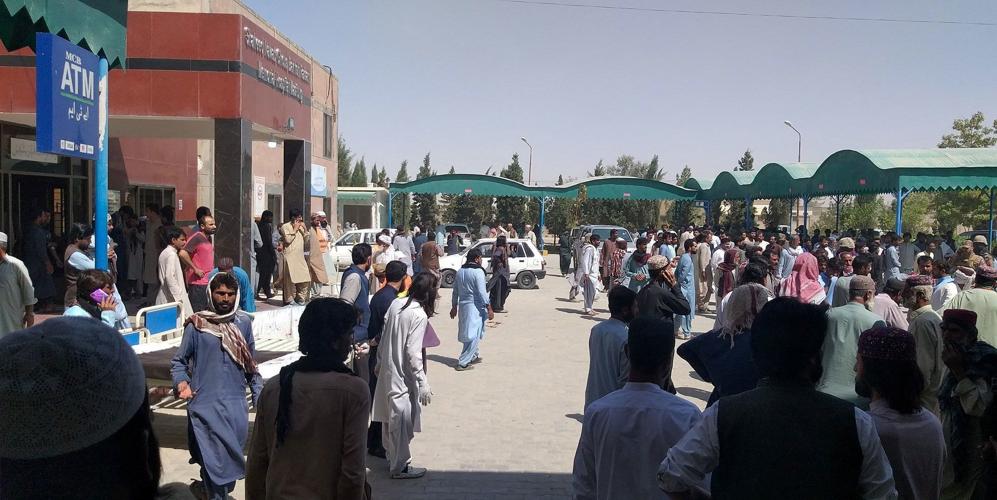Tragedy Strikes: Devastating Blast Claims 52 Lives at Religious Procession in Restive Southwest Pakistan

Tragedy Strikes: Devastating Blast Claims 52 Lives at Religious Procession in Restive Southwest Pakistan
In a harrowing incident that has sent shockwaves throughout the nation, at least 52 people were tragically killed and dozens more left wounded in what authorities believe to be a suicide attack during a religious procession on Friday. The somber event unfolded in the Mastung district of Balochistan, a province that has long grappled with unrest due to separatist movements fueled by grievances over resource exploitation. Simultaneously, a separate explosion rocked a mosque near Peshawar City in the Khyber Pakhtunkhwa province, claiming at least four lives and injuring 11.
A Day of Celebration Shattered
The tragedy unfolded during a religious procession commemorating the birthday of the Prophet Mohammed. Thousands of devotees had gathered to mark this sacred occasion when a deafening blast tore through the crowd. Jan Achakzai, the information minister of Balochistan province, reported the devastating news, confirming that the explosion had been caused by what is believed to be a suicide attacker. The resultant chaos left 52 innocent lives lost and numerous others with severe injuries.
The Mastung district, situated in the southwestern reaches of Pakistan, has sadly become no stranger to violence and instability. For years, it has been at the heart of a simmering insurgency, with separatist factions demanding independence from Pakistan. Their grievances center on what they perceive as the state’s monopolization and exploitation of the region’s abundant mineral resources. As the authorities and families grapple with the aftermath of this latest tragedy, the incident has once again thrust the province into the national spotlight.
A Protracted Struggle for Autonomy
Balochistan, Pakistan’s largest province by land area, boasts vast reserves of natural resources, including minerals, gas, and oil. However, many Baloch nationalists argue that the benefits of these riches have disproportionately flowed out of the province, leaving its people marginalized and impoverished. This perception of economic and political exploitation has fueled a protracted struggle for autonomy, often descending into violence.
The separatist movements in Balochistan, while fragmented, have been relentless in their pursuit of self-determination. They cite historical grievances, including the suppression of their cultural identity and economic subjugation by the central government, as primary motivations for their actions. Despite successive governments’ efforts to address these concerns through negotiations and development initiatives, the root issues remain largely unresolved.

A Nation in Mourning
As news of the tragedy spread across Pakistan, an outpouring of grief and condolences engulfed the nation. Political leaders, religious figures, and citizens from all walks of life expressed their solidarity with the victims and their families. Prime Minister Imran Khan condemned the attack in the strongest terms, pledging the government’s full support to bring the perpetrators to justice.
The tragedy has underscored the urgent need for improved security measures during religious gatherings and processions, which are often targeted by extremist elements in Pakistan. This incident, in particular, has raised questions about the safety of events that draw large crowds and whether sufficient safeguards were in place.
A Second Blast Shatters Peace in Peshawar
In a cruel twist of fate, another explosion occurred on the same day, this time in the northwestern Khyber Pakhtunkhwa province. The blast struck during Friday prayers at a mosque located near Peshawar City, claiming the lives of at least four individuals and injuring 11 more. Local law enforcement officials revealed that two separate explosions rocked the mosque in Hangu, causing its roof to collapse and potentially trapping worshipers inside.
This second incident has added to the nation’s sense of sorrow and vulnerability. It reinforces the pressing need for enhanced security measures at places of worship and public gatherings throughout the country.

A Despicable Act of Violence
The nature of these attacks, targeting gatherings of religious significance, has drawn widespread condemnation from across Pakistan’s political spectrum. Such acts of violence are not only heinous but also deeply distressing in a country where religion holds immense importance in the lives of its people.
While no group has claimed responsibility for these tragic incidents at the time of writing, authorities are actively investigating both cases. Pakistan has been grappling with various extremist elements, including the Taliban and other militant groups, for years. These groups have often targeted religious gatherings and minority communities in their bid to destabilize the country.
International Condemnation and Support
Beyond Pakistan’s borders, the international community has expressed its condolences and condemnation of the attacks. World leaders, including the United Nations Secretary-General, have voiced their solidarity with Pakistan in the face of these horrific incidents. The need for collective action against terrorism and extremism remains a global imperative.
The United States, which has been closely monitoring the security situation in Pakistan, has pledged its assistance in the investigations and offered condolences to the victims’ families. The U.S. State Department reiterated its commitment to partnering with Pakistan in the fight against terrorism and extremism.

The Path Forward
As Pakistan mourns the loss of innocent lives in these senseless acts of violence, the nation faces a critical juncture. Balochistan’s longstanding grievances must be addressed through a comprehensive dialogue process that takes into account the region’s unique challenges and aspirations. A lasting solution will require the involvement of all stakeholders, including the federal government, provincial authorities, and the Baloch nationalist groups.
Additionally, the government must intensify efforts to enhance security at religious gatherings and public places across the country. Vigilance and proactive measures are essential to prevent further tragedies of this nature.
While these dark days have left Pakistan reeling, they have also highlighted the resilience of its people and their determination to stand united against the forces of violence and extremism. As the nation mourns its losses, it must also look toward a future where peace, tolerance, and justice prevail. Only through collective action and unwavering resolve can Pakistan hope to overcome the challenges that threaten its stability and progress.




